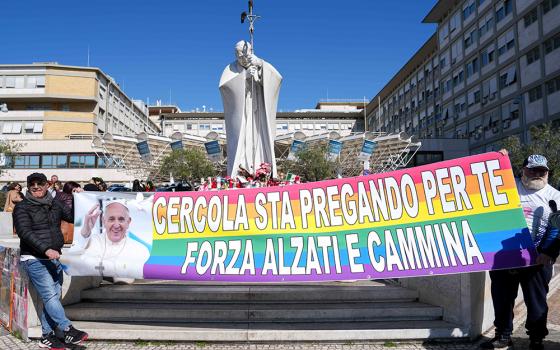Fr. Michael Ryan has been pastor of St. James Cathedral in Seattle since 1988. His recent article in America magazine, "What If We Said, 'Wait'?: The case for a grass-roots review of the new Roman Missal" (December 14, 2009), has evoked a heavy and largely positive response. By the latter part of January, well over 12,000 people had submitted signatures in support of Ryan's efforts.
In a letter dated Dec. 3, Ryan shared some of the background and motivation for his America article.
"For some time, as I've followed ... the bishops' debates, read many of the new texts, discussed them with brother priests, and visited about them with people in the pews, I've become aware of how difficult it's going to be to 'sell' ordinary, faithful, good Catholics on the new, Latinized translations of the Missal. And with good reason because some of them are so bad and the principles underlying the translations are so questionable.
"And that's not all. I'm more than troubled when I realize that it's almost exclusively the pastors of this country who will be saddled with the task of getting people to understand why they are getting new translations and why the translations will be better than what they're used to: better for their prayer life and better for the church. To put it as succinctly as possible, if I haven't been able to sell myself on this, how will I ever successfully sell it to the people I served!"
At the beginning of his article Ryan recalls, as a seminarian at the North American College in Rome, that he was in St. Peter's Square in early December 1963 when Pope Paul VI and his brother bishops presented the Constitution on the Sacred Liturgy, which the Second Vatican Council had just approved and which the pope officially promulgated.
The constitution had passed overwhelmingly: 2,147 to 4. It was not the product of a small group of "hijackers" who had somehow won over a bare majority of unsuspecting council fathers. On the contrary, the constitution had virtually unanimous support.
"Not in my wildest dreams," Ryan writes, "would it have occurred to me then that I would live to witness what seems more and more like the systematic dismantling of the great vision of the council's decree. But I have. We Catholics have."
He thinks that the Vatican's Congregation for Divine Worship and the Discipline of the Sacraments has "raised rubricism to an art form." He also references the so-called Tridentine Mass, recently reinstated in spite of the fact that Pope Paul VI explicitly mandated that there not be two separate liturgies in the Roman Rite.
Ryan sees the present moment as "one more assault on the council and, sadly, one more blow to episcopal collegiality." He reminds his readers that Vatican II had given to each conference of bishops the authority to produce its own translations of the Mass texts.
To be sure, these translations were to be approved by the Holy See, "but not, presumably, to be initiated, nitpicked and controlled by it."
"It is true that the church could gain some credibility by giving us more beautiful translations, but clumsy is not beautiful, and precious is not prayerful."
The reactions of both small and large groups of Catholics, when actually presented with samples of the new translations, run the gamut from laughter to outrage. Ryan predicts that, when and if these new translations are eventually imposed upon parishes throughout the English-speaking world, there will be "an almost certain fiasco."
What to do, therefore? Ryan urges pastors to mobilize and ask their bishops to hold off on the implementation of the new translations until they can be carefully road-tested. As of now, however, the bishops seem to be weary of the whole matter.
If the bishops have nearly given up, what about the priests? Does obedience to the bishops mean that priests must be complicit in something they are convinced is pastorally wrongheaded?
Ryan urges pastors, pastoral councils, liturgical commissions, and presbyteral councils to appeal to the bishops for a time of reflection and consultation, including some careful market-testing of the new translations in selected parishes and regions. Only after that should we move forward.
Ryan also asks those who agree with him to log on to the Web site www.whatifwejustsaidwait.org. "If our bishops know the depth of our concern," he writes, "perhaps they will not feel so alone."
One hopes that he is right.
© 2010 Richard P. McBrien. All rights reserved. Fr. McBrien is the Crowley-O'Brien Professor of Theology at the University of Notre Dame.




